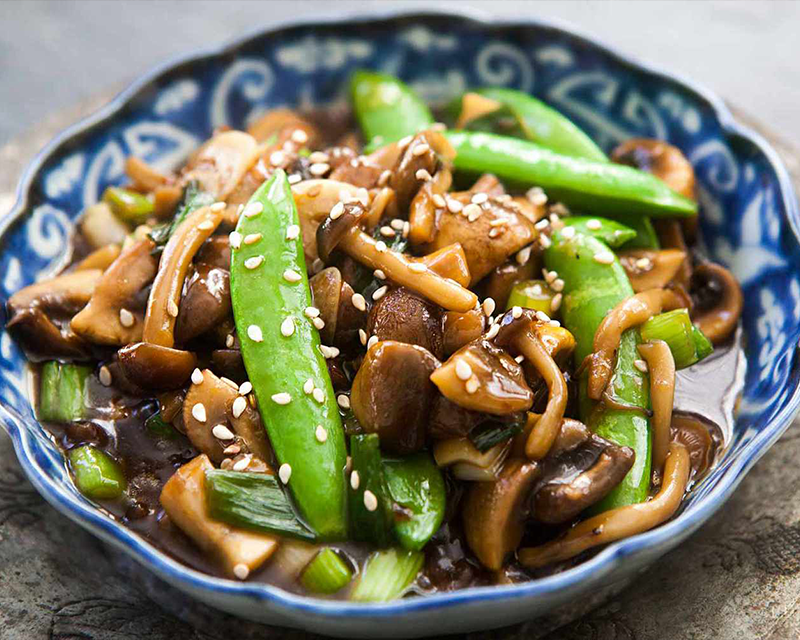Benefits of incorporating mushrooms into your diet:
- Mushrooms offer a wide range of health benefits, making them a valuable addition to any diet.
- Rich in antioxidants, vitamins, and minerals, mushrooms can help boost immunity, improve digestion, and support overall well-being.
- They are also low in calories and fat, making them a great option for those looking to maintain a healthy weight or improve their diet.
- Additionally, mushrooms are a good source of protein and fiber, which can help promote feelings of fullness and aid in weight management.
- Research has also shown that certain compounds in mushrooms may have anti-inflammatory and anti-cancer properties, further highlighting the importance of including these fungi in your meals.
- Whether enjoyed sautéed, grilled, or added to soups and salads, mushrooms can elevate the nutritional value of your dishes and contribute to a balanced and healthy diet.
Different varieties of mushrooms to explore:
There is a wide range of mushrooms available for culinary exploration, each offering unique flavors, textures, and nutritional benefits. One popular variety is the shiitake mushroom, known for its robust umami flavor and meaty texture, making it a versatile ingredient in dishes such as stir-fries and soups. Another beloved choice is the cremini mushroom, which is similar to button mushrooms but boasts a richer flavor profile, making it a great addition to pasta dishes and sauces.
.

For those looking to add a pop of color to their meals, consider trying the vibrant and peppery chanterelle mushroom. This fungus is prized for its delicate flavor and distinctive trumpet-like shape, making it a visually appealing and flavorful addition to dishes like omelets and risottos. Additionally, the oyster mushroom offers a mild and seafood-like taste, perfect for pairing with seafood or adding a subtle depth to vegetarian dishes.
Nutritional value of mushrooms:
- Mushrooms are a nutritional powerhouse, packing a punch with essential vitamins and minerals.
- They are an excellent source of B vitamins such as riboflavin, niacin, and pantothenic acid, which play a crucial role in energy metabolism and cell function.
- Additionally, mushrooms are rich in selenium, a powerful antioxidant that helps reduce oxidative stress in the body.
- Moreover, mushrooms are a great way to boost your intake of important minerals like copper, potassium, and phosphorus.
- Copper is essential for forming red blood cells and maintaining healthy bones and nerves, while potassium helps regulate blood pressure and muscle function.
- Phosphorus is necessary for the growth and repair of tissues in the body, making mushrooms a valuable addition to a balanced diet.
Health benefits of consuming mushrooms:
Mushrooms are packed with beneficial nutrients that can support overall health. They are a great source of antioxidants, which help protect the body from oxidative stress and inflammation. Additionally, mushrooms are low in calories and fat, making them a healthy option for those looking to manage their weight.
Consuming mushrooms can also boost the immune system due to their high content of beta-glucans, a type of fiber that has been shown to enhance immune function. Furthermore, mushrooms are rich in vitamins and minerals such as vitamin D, selenium, and potassium, which are essential for various bodily functions. Incorporating mushrooms into your diet can help promote a well-rounded and nutritious eating plan.
Versatility of mushrooms in cooking:

Mushrooms are incredibly versatile in cooking, as they can be used in a variety of dishes to add depth and flavor. From soups and stews to stir-fries and salads, mushrooms are a versatile ingredient that can be incorporated into almost any recipe. They can be sautéed, grilled, roasted, or even pickled to create different textures and tastes in dishes.
Their earthy and umami-rich flavor makes mushrooms a great meat substitute for vegetarian and vegan dishes. They can be used to create hearty mushroom burgers, mushroom steaks, or even mushroom bolognese sauce. Additionally, mushrooms can be stuffed with various fillings like cheese, herbs, and breadcrumbs to make a delicious appetizer or side dish. The possibilities are truly endless when it comes to cooking with mushrooms.
Ways to incorporate mushrooms into your meals:
Sautéing mushrooms with garlic and herbs can enhance their earthy flavor, making them a perfect addition to pasta dishes, omelets, or as a topping for grilled meats. Another simple way to enjoy mushrooms is by adding them to stir-fries for a quick and nutritious meal. Their meaty texture makes them a great vegetarian option that can satisfy even the biggest of appetites.
For a light and refreshing option, try incorporating mushrooms into salads by either sautéing them as a warm topping or adding them raw for a crunchy texture. Mushrooms can also be blended into soups and stews to add depth and richness to the flavor profile. Experimenting with different cooking techniques and flavor pairings can help you discover new ways to incorporate these versatile fungi into your daily meals.
Mushrooms as a sustainable food option:
Mushrooms are gaining recognition as a sustainable food option due to their unique growth characteristics.
These fungi can be cultivated indoors, using minimal space and resources compared to conventional agriculture.
Unlike many crops that rely heavily on soil, water, and sunlight, mushrooms can thrive in controlled environments with recycled waste products, making them an eco-friendly choice for sustainable food production.
In addition, mushrooms have a rapid growth cycle, allowing for quick harvests and continuous production throughout the year.
This efficient use of time and resources contributes to the sustainability of mushroom farming practices.
Furthermore, the byproducts and waste generated from mushroom cultivation can be repurposed as compost, reducing overall waste and further enhancing the eco-friendly nature of mushroom production.
Mushrooms as a source of vitamins and minerals:
Mushrooms are a powerhouse of essential vitamins and minerals that are vital for maintaining overall health. They are particularly rich in B vitamins such as riboflavin, niacin, and pantothenic acid, which play a crucial role in energy production, red blood cell formation, and brain function. Additionally, mushrooms are a good source of minerals like selenium, copper, and potassium, all of which contribute to various physiological processes in the body.
Incorporating mushrooms into your diet can help bridge any nutritional gaps and provide a natural way to boost your intake of essential nutrients. Whether sautéed as a side dish, blended into soups and stews, or grilled as a meat alternative, mushrooms offer a versatile and delicious option to enhance the nutritional profile of your meals. So why not add some mushrooms to your next dish and reap the many benefits they have to offer?

Impact of mushrooms on gut health:
Mushrooms play a significant role in promoting gut health due to their rich content of dietary fiber, specifically beta-glucans. These compounds act as prebiotics, feeding the beneficial bacteria in the gut and supporting a healthy digestive system. By nourishing the gut microbiota, mushrooms can help enhance digestion and regularity, leading to overall improved gut health.
In addition to their prebiotic properties, mushrooms also contain polysaccharides that have been shown to possess anti-inflammatory and immune-modulating effects within the gut. These compounds can help to reduce inflammation in the digestive tract, promoting a balanced gut environment and supporting optimal gut function. Overall, incorporating mushrooms into your diet may have a positive impact on gut health by promoting a diverse and thriving microbiome.
Potential risks and precautions when consuming mushrooms:
One important precaution when consuming mushrooms is to ensure that they are properly identified before being consumed. Some wild mushrooms can be toxic and lead to serious health issues if ingested. It is advisable to purchase mushrooms from reputable sources or consult with knowledgeable foragers to minimize the risk of consuming poisonous varieties.
Individuals with certain medical conditions or allergies should exercise caution when consuming mushrooms. For example, those with fungal allergies may experience adverse reactions to mushrooms. Additionally, individuals with compromised immune systems or specific health concerns should consult with a healthcare provider before incorporating large quantities of mushrooms into their diet. Taking these precautions can help prevent any potential risks associated with consuming mushrooms.


